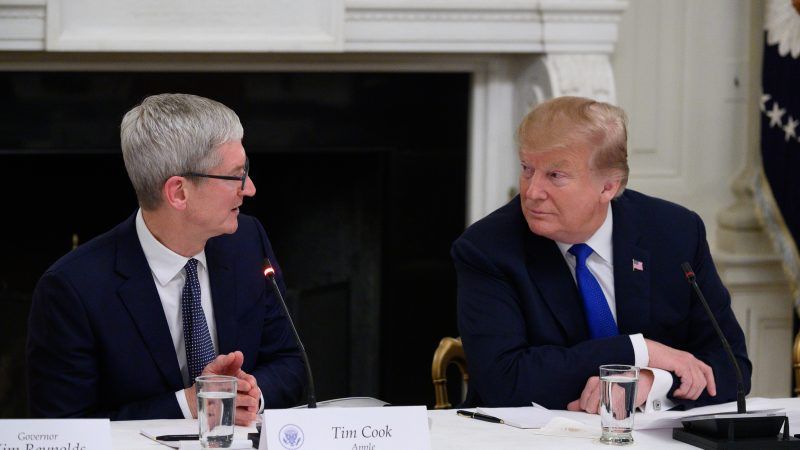The Trade War Is Going So Well That Trump Might Bail Out Apple
"If I didn't help them, they would have a big problem," says Trump. But maybe he's already "helped" enough.

While speaking to reporters at the White House on Tuesday, President Donald Trump tried to argue that his trade war was sapping China of its economic strength.
Instead, he inadvertently pointed out how the trade war is also hurting American companies—and seemed to suggest that his administration could be preparing to bail out of the world's most profitable businesses.
"If I didn't help certain companies—American companies, like Apple," Trump said, before promising that any assistance given to Apple would be "for a very short period of time" until the tech firm was able to relocate its supply chains out of China.
"If I didn't help them, they would have a big problem," Trump said.
Trump teases some sort of bailout for Apple for hardship the company is facing because of his trade war.
"This would be very short-term. If I didn't help them, they would have a big problem … the smart people say 'thank you very much,' and the dumb people have no idea." pic.twitter.com/83mye1qmEI
— Aaron Rupar (@atrupar) August 20, 2019
Given the White House's haphazard handling of the trade war and the president's propensity for going off-message, it's hard to say what exactly Trump will do. But it is notable that he seems to be considering such a deal—just days after having dinner with Apple CEO Tim Cook. After that Friday night dinner, Trump told reporters that Cook "made a very compelling argument" about how tariffs were making it more difficult for Apple.
It seems likely that Apple will take a beating from the next round of tariffs set to take effect on September 1, but so will everyone else. According to an analysis from investment bank JP Morgan, the next round of tariffs will cost the average household between $600 and $1,000 annually, and Apple figures it will be one of many well-known American brands that will take a hit.
2. JPMorgan has a list of US companies most exposed to the Sept 1 tariffs .. pic.twitter.com/0d0P5ZyjGX
— Carl Quintanilla (@carlquintanilla) August 20, 2019
It's possible to interpret Trump's remarks on Tuesday as him suggesting that other American companies could get similar bailouts—but that's an even more untenable position. Trump's earlier bailouts of farmers hurt by the trade war have already cost more money than all his tariffs have generated, so how would the White House pay for another round of tariff relief aimed at huge corporations like Nike, Boeing, and Apple? Even if there was a way to do that, would the same bailouts be offered to smaller businesses?
That's pretty unlikely. Again, look at how the farm bailout was handled. An analysis by the Environmental Working Group, an agriculture policy center, found that 54 percent of the first $8.4 billion spent by the Trump administration's tariff relief program flowed to just 10 percent of farmers receiving aid. More than 1,000 people living in America's 50 largest cities have also received bailout payments—which isn't too surprising since the federal government has a long history of sending farm subsidies to people who aren't farmers. In all, the farm bailouts are a good indication of the problems with a centrally planned economic policy. It might sound good to say that we'll cover the losses of farmers and companies hurt by the trade war, but actually doing that results in typical bureaucratic waste.
If Trump is suddenly more concerned about the plight of American businesses forced to pay his tariffs, then offering to bail Apple out is exactly the wrong thing to do. Even if some sort of federal subsidy would help Apple avoid the tariff costs, it would do nothing to help all the other American businesses that are suffering under those same tariffs—companies whose CEOs don't have access to dinner with the president.
